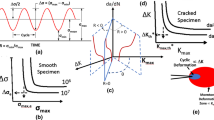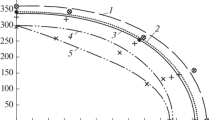Abstract
Analysis of available data suggests that the phenomenon of fatigue of materials results primarily from alternating shearing stress producing cracks along shear planes, and that the resistance to fatigue fracture is influenced by other factors. Some of these factors are: changes in structure of the material resulting from heat treatment, elastic distortion from applied stresses (or residual stresses), or plastic deformation; the mode of crack propagation (by shear or by separation); and the normal stress on planes of principal shear stress (called here the complementary normal stress).
Access this chapter
Tax calculation will be finalised at checkout
Purchases are for personal use only
Preview
Unable to display preview. Download preview PDF.
Similar content being viewed by others
Bibliography
Findley, W. N.: NACA TN 2924, 1953.
Findley, W. N., F. C. Mergen and A. H. Rosenberg: Proc. ASTM 53, 768 (1953).
Findley, W. N.: Proc. ASTM 54, 836 (1954).
Gough, H. J.: Proc. Instn mech. Engrs 160, 417 (1949).
Lea, F. C, and H. P. Bttdgen: Engineering 122, 242 (1926).
Ono, A.: Mem. Col. Engr Kyushi Imp. Univ., 2, No. 2, 117 (1921).
Findley, W. N., and P. N. Mathub: Modified Theories of Fatigue Failure under Combined Stress, presented at the Soc. exp. Stress. Anal, meeting, Los Angeles 1955.
Findley, W.N., and P. N. Mathub: Anistropy of Fatigue Strength of a Steel and two Aluminum Alloys in Bending and Torsion, to be presented at the ASTM meeting, Atlantic City 1955.
Editor information
Editors and Affiliations
Rights and permissions
Copyright information
© 1956 Springer-Verlag OHG., Berlin · Gottingen · Heidelberg
About this paper
Cite this paper
Findley, W.N. (1956). Theories relating to fatigue of materials under combinations of stress. In: Weibull, W., Odqvist, F.K.G. (eds) Colloquium on Fatigue / Colloque de Fatigue / Kolloquium über Ermüdungsfestigkeit. IUTAM Symposia. Springer, Berlin, Heidelberg. https://doi.org/10.1007/978-3-642-99854-6_4
Download citation
DOI: https://doi.org/10.1007/978-3-642-99854-6_4
Publisher Name: Springer, Berlin, Heidelberg
Print ISBN: 978-3-642-99856-0
Online ISBN: 978-3-642-99854-6
eBook Packages: Springer Book Archive




